#public theater
Photo
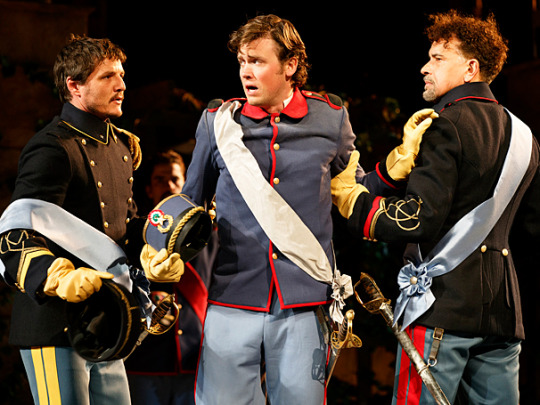
Pedro Pascal as Don Jon, Jack Cutmore-Scott as Claudio & Brian Stokes Mitchell as Don Pedro in Much Ado About Nothing
#shakespeare#william shakespeare#much ado#much ado about nothing#theater#public theater#pedro pascal#brian stokes mitchell#theatre
136 notes
·
View notes
Text
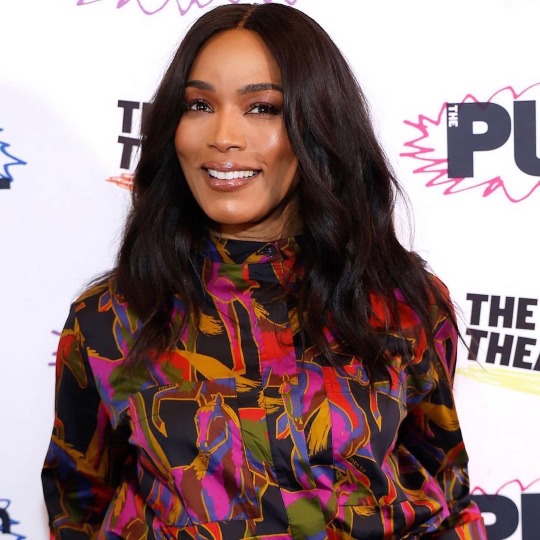

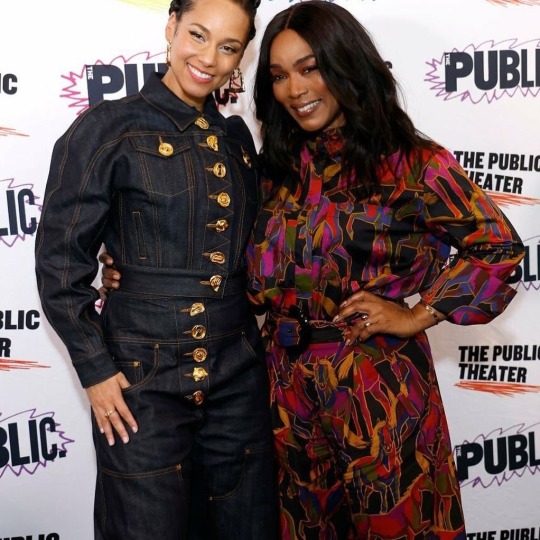
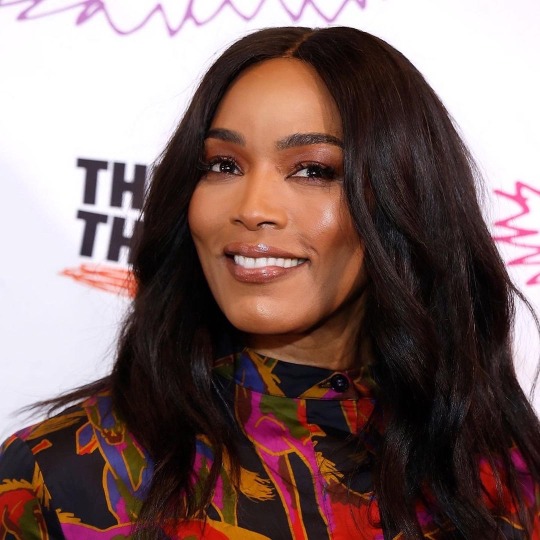

Angela Bassett looking soooo good when she attended the new Alicia Keys musical “Hell’s Kitchen” in the East Village on Sunday Night at the Public Theater.
plus a video from behind the scenes when Angela Bassett was in The Metropolitan Opera in New York for the Malcolm X Opera
stylist: jennifer austin
📸 and makeup by camaraaunique on IG
hair by derickmonroe
#angela bassett#tv: 911#athena grant#911#911onabc#911 on abc#911abc#abc#abc network#911hiatus2023#alicia keys#hells kitchen#public theater#east village#derick monroe#jennifer austin#camara aunique#Malcolm X Opera#The Met#The Metropolitan Opera#The Met Opera#Malcolm X#Betty Shabazz
28 notes
·
View notes
Text

Daily Mirror
The Hellvettes, Freaky and Dead Fab Delts
Public Theater, Fukutsu-shi, Fukuoka-ken (2024-04-13)
9 notes
·
View notes
Text
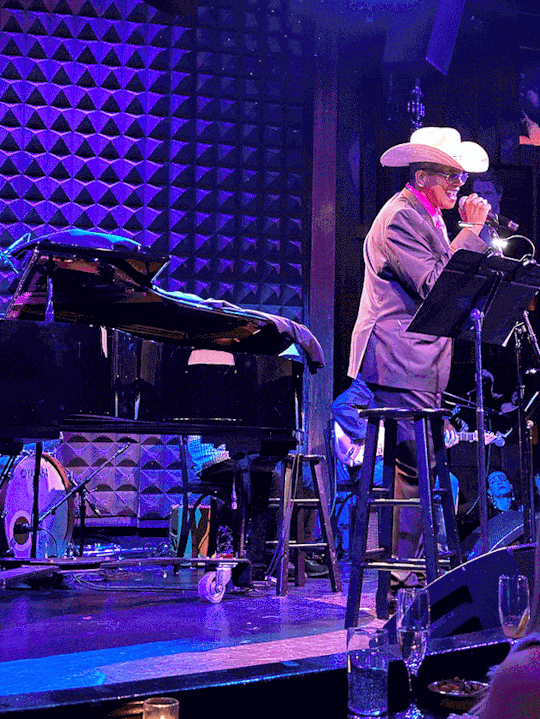
The incomparable Pamela Sneed pays tribute to Big Mama Thornton, the original performer of "Hound Dog" which sold over 500,000 copies, the most at that time for a Black woman. Hope the show comes back to Joe's Pub!
GIF: Bruce Morrow
@pamela_sneed #bigmamathorton #joespub #blackhistorymonth #elvispresley #hounddog #lesbianhistory #lgbtqiahistory #lgbtqhistory #blackqueerlivesmatter
#Pamela sneed#bruce morrow#brucemorrow#bruce-morrow#digital art#the moment that#my art#myart#animated gif#animated gifs#Joe's pub#public theater#big mama Thornton#elvis presley#hound dog#lgbtqia#lgbtq history#black artist#rock and roll#gifs in tumblr#gifs on tumblr#my gif#my gifs
6 notes
·
View notes
Text
Alicia Keys' HELL'S KITCHEN Musical Coming To The Public Theater In The Fall
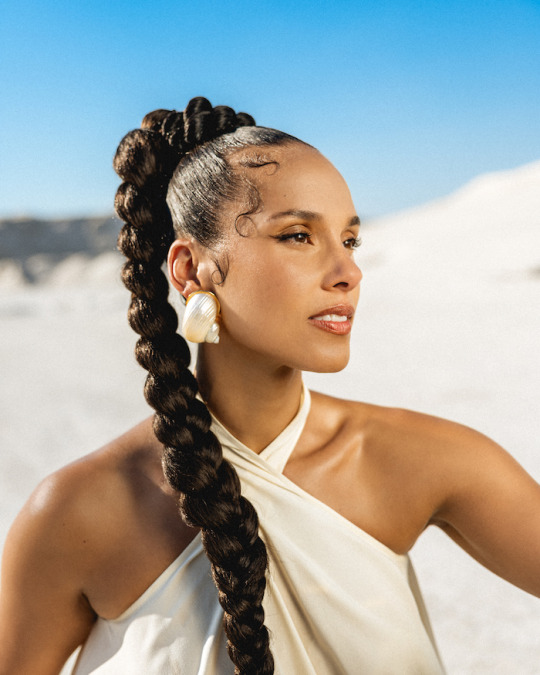
Alicia Keys' original HELL's KITCHEN musical is coming to the New York Public Theater in the fall. Keys wrote new music for the production based on her life in the Hell's Kitchen neighborhood in New York City. Playwright Kristoffer Diaz, choreographer Camille A. Brown, director Michael Greif and musical supervisor Adam Blackstone all worked on the show. Seventeen-year-old Ali is the main character who is seeking her dream of stardom and falls in love with a drummer. Ali and her mother address issues of race and growing up in the chaos of New York City.
The cast of HELL’S KITCHEN will include Shoshana Bean (Jersey), Chad Carstarphen (Ray/Ensemble), Reid Clarke (Ensemble), Chloe Davis (Ensemble), Nico DeJesus (Ensemble), Brandon Victor Dixon (Davis), Timothy L. Edwards (Ensemble), Badia Farha (Understudy), Vanessa Ferguson (Tiny/Ensemble), David A. Guzman (Ensemble), Crystal Monee Hall (Crystal/Ensemble), Gianna Harris (Understudy), Chris Lee (Knuck), Jackie Leon (Jessica/Ensemble), Kecia Lewis (Miss Liza Jane), Raechelle Manalo (Ensemble), Maleah Joi Moon (Ali), Onyxx Noel (Understudy), Sarah Parker (Ensemble), William Roberson (Understudy), Niki Saludez (Ensemble), Mariand Torres (Maria/Ensemble), Donna Vivino (Understudy), and Lamont Walker II (Riq).
HELL's KITCHEN runs from October 24-December 10th. Public Theater Supporter Plus tickets go on sale June 13th and Public Theater Support tickets go on sale June 15th. Full-price single tickets will be available on July 18th. For more information check out publictheater.org.
3 notes
·
View notes
Text
Playwright James Ijames on 'Fat Ham,' the spotlight on Black queerness and life after a Pulitzer
A Q&A with the Pulitzer Prize–winning playwright of 'Fat Ham.'
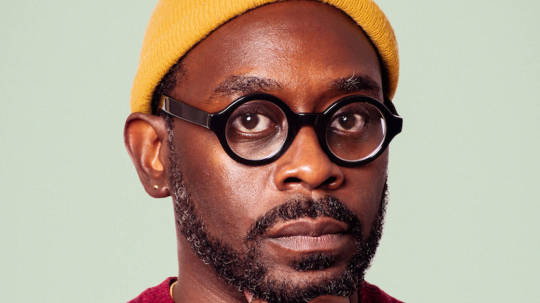
Written by Marcus Scott
Wednesday February 8 2023
James Ijames won the 2022 Pulitzer Prize for Drama for Fat Ham, an irreverent riff on William Shakespeare’s Hamlet that feels like a call to arms for Black joy and queer representation. A jambalaya of satire, magical realism and the American domestic sitcom, the play follows Juicy (Marcel Spears), a morose online-college student, as he tries to come to terms with the marriage of his newly-widowed mother, Tedra (Nikki Crawford), to his Machiavellian uncle Rev (Billy Eugene Jones). “This ain’t Shakespeare,” Ijames noted in the show’s program. “Don’t get me wrong. I love Shakespeare, this just ain’t him. This ain’t a tragedy…This play is offering tenderness next to softness as a practice of living. This play is celebrating Blackness that is traditional and weird and lonely and happy and grieving and honest and frightened and brave and sexy and churchified and liberated and poetic.”
Fat Ham had its world premiere in the spring of 2021 in a digital production by Philadelphia’s Wilma Theater. A year later, it made its onstage debut at the Public Theater, directed by Saheem Ali, and became one of the buzziest plays of the season. On March 21, 2023, that production will begin a limited run at Broadway’s American Airlines Theatre. We chatted over FaceTime with the playwright as he prepared to step into rehearsals.
Fat Ham moves Hamlet from a medieval Danish castle to a modern-day cookout in North Carolina. Why a barbecue?
“Barbecues are cumulative spaces. It starts with a few people and then it grows. There’s food, and people are drinking. It’s a space of truth-telling, it’s a space of game-playing, it’s a space of intimacy and warmth—and it’s where secrets come out. My family recently came together for the Christmas holiday and a cousin of mine made an announcement about being pregnant. Everyone was just so excited and lifted by that; everyone’s energy turned towards them in this really beautiful way. I wanted a space where that sort of collective joy was possible and also where a big, messy argument was possible. Where a fight was possible, where drinking was possible, where eating was possible, where romance was possible. In Shakespearean comedies, when you go outside or into the woods—like the forest of Arden [in As You Like It] or the forest in Midsummer—it’s a space where anything’s possible. There’s magic. We’re not inside, in a cold room in a cold castle. We’re outside: We have decorations, we’re colorfully dressed. We are in the sort of space where magic is palpable and possible.”
Juicy is not your typical Hamlet. He is Black and Southern and, as you describe him in the play, “thicc.” What was the motivation behind that?
“Well, I’m Black and from the South, and that drove my desire to play with people that sound and look like me. When you see productions of Hamlet, he's usually white and sort of athletic. I wanted to make a version of this play that was open to a body type that wasn't that; I'm a person who, for pretty much my whole life, has had some struggle with my weight and my perception of what I look like and how I feel in my body. And another thing I wanted to do was to explore Blackness in the South in a way that felt contemporary, that didn't feel held by history—looking at Southern communities right now as opposed to a nostalgic imagination of the Black South.”
Why did you choose for Juicy to have a passion to study Human Resources in college?
“Human Resources is about care and workflow. Efficiency. I wanted Juicy to have a passion for something that felt antithetical to his father. He wants to make sure people are okay.”
How does that contrast reflect other things about the way you have approached Shakespeare’s story?
“I think the play is exploring multiple modalities of masculinity. We see a lot of different kinds of Black masculinity on the stage. We see Juicy, we see Tio, we see Larry, we see Pap and Rev. And there’s a masculinity that’s implied about the community that they live in, that is sort of present in the room. I wanted to show that masculinity is not monolithic—it’s not as simple or cut-and-dried as it’s often depicted. I also wanted to explore cycles of trauma and violence in families. I’m interested in primordial stories, stories that no matter what culture you walk into, there’s like a version of them. I always think of Hamlet as—and I don't know that a lot of people think of it this way—but I think of Hamlet as a Cain and Abel story: the story of a sibling killing their sibling to get ahead. Anybody can relate to that; that’s a [narrative] that you inherit and moves with you through generations. And the younger folks in the play have to make some decisions about whether or not they want to continue that, whether that’s what they want their lives to look like and their relationships to each other to look like. I’m calling into question the stories that we’ve been passed down as wisdom. Because sometimes it’s wisdom, but more and more I look at those stories as cautionary tales of what you shouldn’t do. Vengeance isn’t gonna help Juicy. Killing his uncle is not gonna help Juicy’s life get any better.”
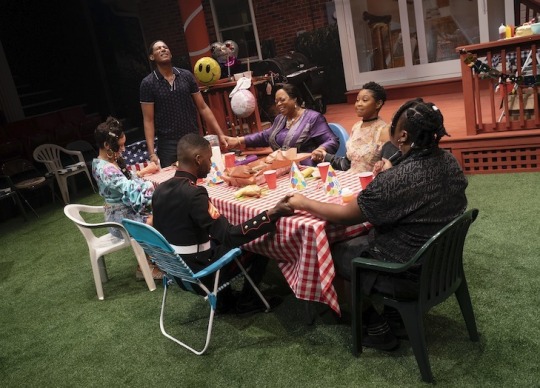
Your breakthrough play was Kill Move Paradise in 2017. How do you think you've changed as a writer since then?
“Oh, gosh. When I look at Kill Move Paradise, that play is quite erratic, you know [he laughs]. I always describe it as the way that I try to metabolize my anger and my fear and anxiety about being a Black body driving around in America, walking around in America, just trying to live my life. And so it has that anxiety in it. It has that fear and nervousness in it. It’s in the text, you can feel it on the page. As I've gotten a little older, I've experienced more and I've written more—the more you write, the better writer you become. I'm more intentional with story, with plot; how I'm weaving a theme or a theory into the action of a play is a bit more sophisticated than it was when I was starting out. The anger is usually shrouded in rebellion or exuberance. At a point in my life, anger sort of dragged me down into a space of high-blood-pressure fury. But I think now the work offers people an invitation to metabolize anger in a different way. By the time we get to the end of Fat Ham, people are dancing in the aisle.”
They certainly are.
“And that is not to negate the fact that we’ve just watched the thing that had pain in it, that had trauma in it, that had violence in it. But just because you’ve been through difficulty doesn’t consign you for the rest of your life to difficulty, to trauma, to pain. We have access to joy, we have access to resilience, we have access to exuberant ecstasy. Black history, in this country in particular, teaches us that: The blues and jazz and hip-hop come out of extraordinary awful scenarios and settings. Those art forms are undeniably both Black, but undeniably exuberant, resilient, unabashed, queer—all of those things! They possess all of those things. When I sit down to write a play, I know that at the end I have to send people out into the world, into the streets, into workplaces, into homes. My hope is that I’m leading them to some hope.”
This play is pretty fantastical, and there are various displays of spectacle and magic. There are also a panoply of images and homages to the Pan-African cultural experience—allusions to Louisiana Voodoo as well as Central African, Creole and Haitian Hoodoo symbology.
“Ghosts are a feature in a lot of my plays. Magic is a feature in a lot of my plays. Because I’m a person who grew up with people who kind of had magical ways of thinking. I grew up Baptist: hardcore, every Sunday, sang in the choir, youth ministry, youth usher—like, I am a church gay! I also grew up in a family that has New Year’s Eve traditions that they do, and will throw salt over their shoulder, or say “Don’t sweep over a single man’s shoe because he won’t get married.” That sort of Hoodoo connection to the spirit world and connection to ancestors was also a big part of the family that I grew up in. And so magic in that respect feels very real to me. Ancestors feel very present—the reverence for people who have passed on is immense. So, to me, the ghost of Juicy’s father showing up isn’t just a specter from this other world that is coming with caution and with information. Juicy is having a conversation with his ancestor and he talks to his ancestor, the way that I talk to mine. The thinness of that veil between here and there—I relish in that, and the theatrical allows you to do that with a lot of ease. I didn’t want the ghost to be a joke. He’s funny—that cat is extremely funny—but he also has these great moments of, like, “Wow, I really messed you up.”
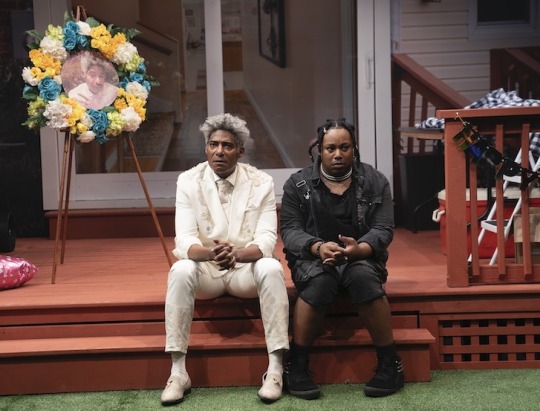
There is a long literary tradition of Black writers explaining Blackness to people who aren’t Black. You don’t do that here. In fact, this play comments on performing Blackness, trauma porn and “enterpainment” on stage—and it’s done with humor. Why was this important to you?
“Humor is powerful. It opens us up to hearing things in a new way. It’s a big part of all of my plays. The question about explaining Blackness is huge to me. I don’t feel like I have to explain Blackness to an audience. I’m assuming that everyone will catch up who doesn’t understand.”
At the end of the show, there’s a cover of the funky dance-pop disco tune “Kill The Lights” sung by Broadway actor Mykal Kilgore. What inspired that particular needle drop?
“I love disco music, just personally. Anybody can dance to it. If you are off-rhythm, you will be on a rhythm with disco music because it’s four-on-the-floor and is just all-encompassing. It strives for ecstasy, it strives for moving from a passage from one state to another. Probably because they were all like using drugs and having sex while they were listening to it in the Seventies and Eighties. But this is a contemporary artist singing in the disco style. It’s not a song from the era. It just moves people! That music moves people.”
If you were to classify your previous plays by genre, with Fat Ham being disco, what would your other shows be?
“Ooh.” [He laughs.] “I think Kill Move Paradise, if I had to put a genre to it, it’s Southern hip-hop, right? It’s sort of grounded in that culture. I would say White is like pop music—it’s like my Ariana Grande album. And Miz Martha is Americana music. It’s like bluegrass with a trap beat.”
Only nine writers of Black descent have been awarded the Pulitzer Prize for Drama in its 105-year history: Charles Gordone for No Place to Be Somebody, Charles Fuller for A Soldier’s Play, August Wilson for Fences and The Piano Lesson, Suzan-Lori Parks for Topdog/Underdog, Lynn Nottage for Ruined and Sweat, and the last four prizes in a row—Jackie Sibblies Drury for Fairview in 2019, Michael R. Jackson for A Strange Loop in 2020, Katori Hall for The Hot Wing King in 2021 and now you. Is something going on in the zeitgeist? Is there something special about Black writers that make their work more urgent right now?
“I think a few things are happening. Black writers and Black directors have been trying to push the form in new directions, to be both in conversation with the cannon and also pushing against the cannon. Those four plays—starting with Fairview and going to A Strange Loop, The Hot Wing King and Fat Ham—all four of those plays are actively doing those things. And so are some plays that haven’t won Pulitzers but have been defining culturally, like Slave Play and things like KPOP. The audience for that work is already there and primed, and it’s just waiting for someone to make art for them, you know what I'm saying? People are curious about what is possible in the form. I remember seeing Fairview and just being blown away by the audacity of it. It made me want to be more ambitious—to create more of a social experiment with my work in collaboration with an audience. I think the same thing is true of A Strange Loop and Hot Wing King in terms of those plays’ exploration of Black queer identity. And that flows rather beautifully into Fat Ham, which is doing the same sort of thing by taking a play that people cherish like Hamlet and saying, ’Not only is this mine, it’s mine in these particular ways, and this is what I’m gonna keep and this is what I’m gonna discard.’ So some of it is just us, as writers, wanting the form to feel as vital and as urgent as possible. And one way to do that is to examine how we write things and try to find new ways into storytelling.”
Those last three plays in particular have centered on Black queerness, and on what we might call radical softness. Is there something in the ether? Was there something in the culture that made us say, “Now that’s something we need to address, to attack, to appraise?” Because it all kind of happened around the same time.
“Hmm. I don’t know. That stretch of plays spanned the heartiest points of the pandemic, and we were all quite hungry for connection, closeness, touch, tenderness. And that offered an opportunity for people to be excited about seeing something that felt soft or vulnerable. I think people respond to that because we want to be better. Culturally, I think, we want to try to do things differently. It remains to be seen whether or not that will continue, but people wanted to engage with things that felt tender, that felt connective, and all of those plays are great examples of that. And I think that’s also true of Fairview; with the separation that it is asking for, it’s asking for people to sit in an embodied space with an idea.”
Last question: How has your life changed post-Pulitzer? Has that changed how people think of you and your work? Or how you think of yourself and your work?
“Oh my gosh! It’s just made my life so much busier, but it’s also made me focus on the work. Refocus on my craft and my practice. I don’t want this prize to freeze me in time. I want to keep pushing and keep expanding what I do.”
Fat Ham begins previews at the American Airlines Theatre on March 21, 2023, and opens on April 12. Tickets are available here. This interview has been condensed and edited for clarity.
Follow Marcus Scott on Instagram:@therealmarcusscott
Marcus Scott

#Marcus Scott#MarcusScott#WriteMarcus#Write Marcus#playwriting#playwrights#playwright#James Ijames#JamesIjames#Fat Ham#FatHam#Broadway#The Public Theater#Public Theater#Time Out#TIme Out New York#TimeOutNewYork#TimeOutNY#Time Out NY
6 notes
·
View notes
Text
What’s the point of the Public Theatre’s Shakespeare in the Park performances airing on PBS if they’re not going to be on home video afterwards?
5 notes
·
View notes
Text
The Complex Exciting Layers of "Sally & Tom" at The Public Theater
#frontmezzjunkies reviews:
#SuzanLoriParks' new play
Sally & Tom
@PublicTheaterNY
d: #SteveHBroadnaxIII
w/ #SunMeeChomet
#GabrielEbert
#LelandFowler
#SheriaIrving
#KristolynLloyd
#AlanoMiller
#KateNowlin
#DanielPetzold
#PublicTheater #SallyAndTomPlay
Sheria Irving, Gabriel Ebert, and the company of The Public Theater’s Sally & Tom. Photo by Joan Marcus.
The Off-Broadway Theatre Review: The Public Theater’s Sally & Tom
By Ross
A simple dance to a well-played violin masks the compelling undertones of The Public Theater‘s fascinating new play, Sally & Tom, written with a sharp edge by Suzan-Lori Parks (Topdog/Underdog). The deep dive, we are…
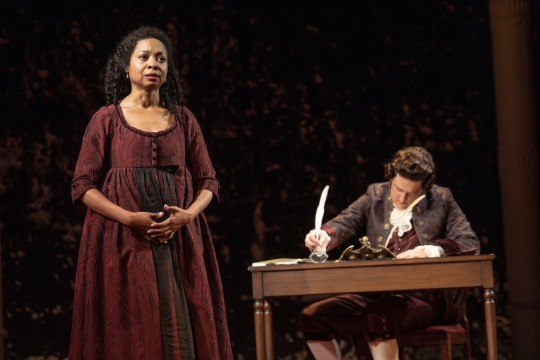
View On WordPress
0 notes
Text
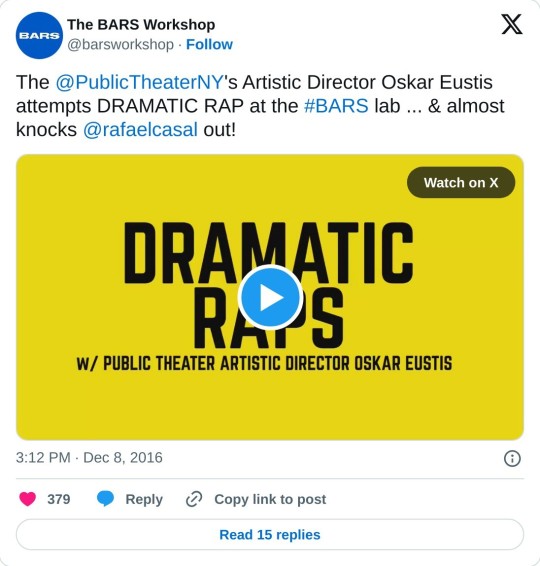
RAFAEL CASAL AND OSKAR EUSTIS - THE BARS WORKSHOP (2016)
The @PublicTheaterNY's Artistic Director Oskar Eustis attempts DRAMATIC RAP at the #BARS lab ... & almost knocks @rafaelcasal out!
0 notes
Text

John Cazile and Meryl Streep in Measure for Measure
"You could see the sparks...look what's going on on that stage."
#shakespeare#william shakespeare#actors#measure#measure for measure#john cazile#meryl streep#shakespeare in the park#public theater
45 notes
·
View notes
Text
youtube
The #BARS MEDLEY VOL 2 | Filmed live at the Public Theater, NY
Filmed LIVE at the PUBLIC THEATER, NY on September 5th, 2016.
BARS Created by Rafael Casal & Daveed Diggs.
MEDLEY Directed by Carlos Lopez Estrada Choreography by Chris Walker Music Composition by Samora Pinderhughes and Erica Telisnor.
Featuring Hosts Adrienne Warren (Tony Nominee, Shuffle Along) Javier Muñoz (Broadway's Hamilton) Rapper Pharoahe Monch, Anthony Ramos (Broadway's Hamilton) Lemon Andersen (Tony winner, Def Poetry) Saray Kay (TED, Def Poetry) Dessa (Hamilton Mixtape, Daveed Diggs (Tony Winner, Hamilton, Black-ish) & Yours truly, Rafael Casal.
PRODUCTION COMPANY: DIKTATOR.
1 note
·
View note
Text

July 23, 2012: The Public Theatre's Into the Woods has its first preview at the Delacorte in Central Park. The cast included Amy Adams, Donna Murphy, Chip Zein, Jessie Mueller, Dennis O'Hare, and Gideon Glick.
0 notes
Text
Joe Papp and the Public Theater
Born 100 years ago today, the great 20th century populist showman Joseph Papp (Joseph Papirofsky, 1921-1991).
Though the name remains known mostly to arts and theatre mavens, I think there is a strong case to be made, if an arguable one, that Papp was the most significant theatre producer of the 20th century. His legacy is so broad and so all-pervasive (and the company he created, the Public…

View On WordPress
0 notes
Text
Joining the Under the Radar Mourners
Everyone's talking about the loss of Under the Radar in my community. I wade into those waters here.
My friend and I enjoy coming up with more accurate names for performing arts festivals here in NYC. You like the Next wave Festival at BAM? Me too! We call it the Previous Wave, though, because almost everything in it hit its stride 30 to 40 years ago. Which is not to say it’s not good! Pina Bausch’s company still performs her work with integrity and style. But Pina Bausch died 14 years ago and…
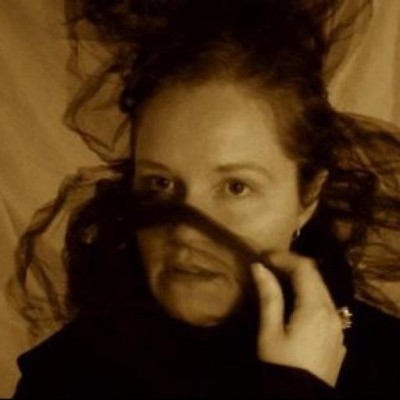
View On WordPress
#downtown#indie#loss#Next Wave Festival#off off broadway#Public Theater#theater#theatre#Under the Radar#weirdo performance
0 notes
Text
Sexual Awaken-ring at The Public Theater
I’m reckoning with the fact that I probably had my sexual awakening at a WWE event as I sit a few yards away from the ring, the air full of musk and sweat and beer and breath- like being inside of a burp.

I haven’t watched wrestling in so long, but I get up and cheer when I feel like I’m supposed to. Luckily, this is the Royal Rumble, an annual event where a new wrestler enters the ring every 90 seconds. It is essentially a last man standing style match, where people are eliminated throughout by being thrown out of the ring (because of this, there are usually no more than about 8 ppl in the ring at a time). When it gets down to the last 10 seconds, a giant countdown appears above, buzzing loudly to introduce the next wrestler (this was, in my opinion, the funniest part of the night: watching everybody sit down just to get right back up again and again and again).
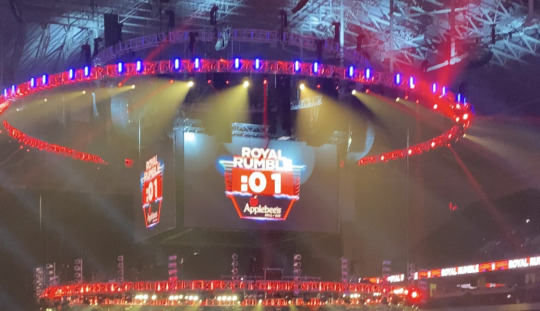
As I sat around all these people cheering and drinking and eating in the arena, all 50,000 of us crowded in to watch a fight, the historical similarity was not lost in me. I imagined that we were all in an open-air colosseum, its magnificent architecture completely blocked from view as people eating turkey legs piled on top of each other to get a better view of the stage.
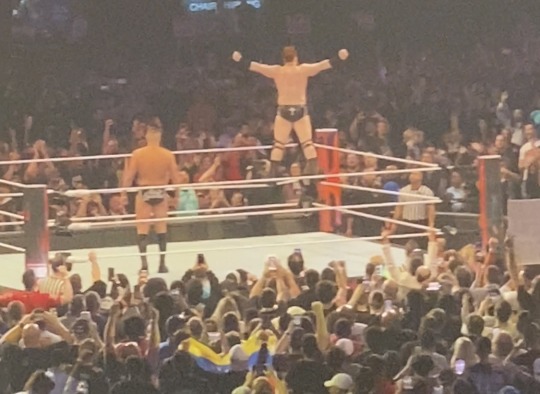
The mention of turkey legs reminded me of another instance of aggressive mainstream public theater: Medieval Times. Medieval Times is a massive building shaped like a castle in a town near you. Enter, and you’ll be transported into a world of princesses and dragons, where the only thing to do is buy merch and watch the duel. Everyone is assigned a section and a color, and you root for whatever color knight you were assigned. Last time I went I was probably 6 years old, and my family and I cheered loudly as the Red Knight came speeding into the arena on the back of a horse. Before The Great Battle begins, the knights choose someone from the audience to bestow the flag, which doubles as a sash, onto. Little me did not know this, so when the Red Knight and his horse stopped in front of me and lowered the pole, my mom and aunt yelled “grab it!” and as I struggled to detach the flag, they stood up to get it down as the knight dashed away.
I can’t remember how I reacted- I don’t think I really cared, but my mom and aunt acted like it was special, so I began to believe it. My mom fastened the sash on me and seconds later someone came to take a picture with a bright flash. I was in between bites of a turkey leg and didn’t really like having my picture taken, but it all happened so fast. The rest of the night went without interruption, as we all cheered on our knight in an old-timey fashion. I took the sash home and I still have it somewhere- it reads “Queen of Love and Beauty”.

Therein lies the main difference between the two realms of public theater: in Medieval Times, everyone is very aware that they are playing a character, the place is literally called Medieval Times. But when one enters the WWE arena, the rules of the real world ostensibly still apply. Of course, everyone knows that WWE is also fake. It’s basically a rite-of-passage to growing up, like finding out the tooth fairy isn't real. There is a suspension of disbelief in the air, but not a complete theater like at Medieval Times. People gather around to see these real people fight, whose real names and political views and possible history of steroid use are all just one google search away. That’s the other thing that causes WWE to teeter the line of real and fake: those who sign up to perform stunts at WWE are also signing up for the possibility (not guarantee) of fame. WWE wrestling is “all fake and doesn’t matter”, until it does: the aforementioned steroid use to look bulkier, the injuries that affect them for the rest of their lives, the touring, performing, and practicing with little time to breathe in between, and of course the fame (even if it is ultimately C or D list) all seem pretty real to me. There is also the metaphorical “realness” of it: WWE storylines and characters often reflect or say something about society. An example of this being the “good vs. evil” mindset pretty much all of the storylines take on, or as it is called in the wrestling world, “face vs. heel”.
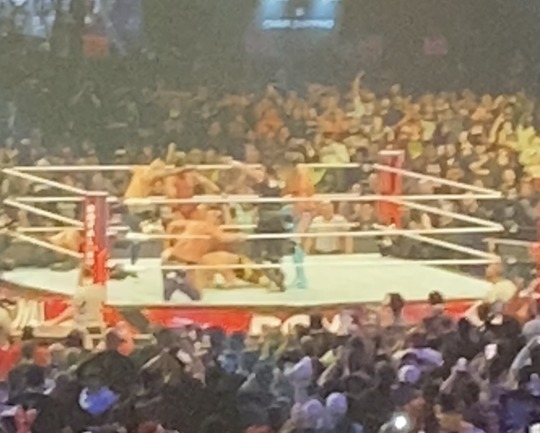
I was going to write something about this aspect of WWE in particular (I even thought of a title as I watched the wrestlers in the ring gang up on disgraced YouTube star-turned-fighter Logan Paul to an uproarious audience: “Good vs. Evil in the WWE”.). But 1. This topic has been talked about a million times 2. That would take a lot of research in order to be done properly and 3. That’s actually not what I found myself thinking about during the show. As I watched Edge, who I once had a massive crush on (though not who I credit with my sexual awaken-ring, that I’ll never tell) and Roman Reigns glisten and gleam while wearing a bright red lei, my mind was elsewhere. “KISS!” My brother and I had jokingly shouted at Reigns and Kevin Owens during the main event. I guess I wasn’t joking.
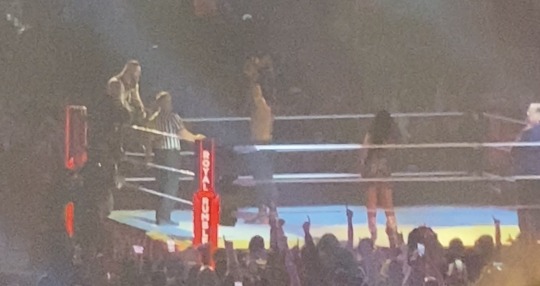
1 note
·
View note
Text
Family Resemblance
....
....
....
.....
I
....
I had another 11pm brain worm.
Enjoy
-x-x-
Daniel Wayne, the younger toddler brother of Bruce Wayne and the son of Martha and Thomas Wayne had been kidnapped the night their parents were murdered.
Daniel had been snagged the moment their killer heard people headed to the alley and Bruce in his state of shock didn't realize it until it was far to late and could only scream in horror (from everything) as his baby brother is crying his name. (If you wanna make it even more heart wrenching, make it Danny's first time being able to say Bruce's name right and/or Bruce had said some mean things to Danny earlier after he accidentally broke something of Bruce's, something like 'I wish youd go away' or 'I never wanted a brother, you're such a bother!')
Bruce is being held by Alfred as some police officers are chasing down the Wayne's parents killer while some stay behind to see if they could do something.
Minutes turn to hours and as they wait, praying the police at least found Danny, Bruce is ridden with guilt. From his parents death to allowing his brother to be kidnapped.
Eventually the police return to give Alfred and Bruce the news. And it's not good.
The killer escaped and Danny was nowhere to be found.
And it would take many years before he would be found.
-x-x-
Bruce gets a call from Damian during school hours one day. When he answers he is greeted with Damian demanding him to get to the school and explain himself.
Confused Bruce asks what does he mean and Damian responds with
"The two new students in class today are the spitting images of you and I father! Either they are poorly created clones or you have more hidden blood children!"
-x-x-
Meanwhile the very students being discussed are calling up someone too
"Ellie? Dan? What's wrong? You better not have made too much chaos already, I just paid for the uniforms for that place."
"DAD! I THINK ANOTHER ONE OF THE FRUITLOOPS FAILED CLONES SOMEHOW SURVIVED!"
"What?"
#danny phantom#danny fenton#crossover#dp x dc#blue rambles#danny phantom dc#writing ideas#random idea#dpxdc#bruce and danny are siblings#danny was a toddler when he was kidnapped#somehow someway he escaped or was dumped out of Gotham#due to how young Danny was and how traumatized he was about that night he forgot everything but his first name#no one really connected the dots that Danny was the missing Wayne child#mostly due to no public photographs of Danny#he had been born very early and no one was sure he was going to make it#and going to the theater had been his first time being finally allowed out of the manor#only for it to end in tragedy#years later though#Danny moves to Gotham with his kids#a deaged and raised from infanthood Danielle 'Ellie' Fenton and Dante 'Dan' Fenton#Damian was not ready to see them#he thinks theyre poorly made clones since one looks more like his father than him and the other is a girl#or more secret children his father didnt know about#Ellie and Dan think Damian is an escaped clone of Vlads#Bruce and Danny meet at the school and Bruce nearly has a heart attack at the young man who looks so much like his parents#Danny is a bit weirded out because Bruce looks very familiar somehow
1K notes
·
View notes